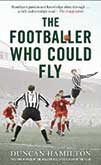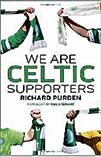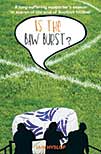 by Duncan Hamilton
by Duncan Hamilton
Century, £14.99
Reviewed by Harry Pearson
From WSC 313 March 2013
A while ago at a book festival in Duncan Hamilton’s native Nottinghamshire I was asked why the literature of cricket tended towards nostalgia. The implication of the question was that the literature of other sports – football in particular – didn’t embrace the elegiac in quite the same way. I’d guess that’s true. Or at least it was until recently. The success of Gary Imlach’s excellent My Father And Other Working Class Football Heroes, released in 2005, has proved that there is an audience for books about football that don’t simply focus on the here and now but drift back into the apparently perpetually mist-wreathed world of long ago. In football terms that is the 1950s (in cricket it would be the Edwardian era).
Duncan Hamilton’s The Footballer Who Could Fly follows two fine works on cricket and taps into a similar vein to Imlach’s book. It’s not just about football but also fathers and sons. Jim Hamilton was a Scottish pitman, an adopted Geordie who was forced by colliery closures to move to Nottinghamshire. He is laconic, his relationship with his stammering only child carried out more or less entirely through conversations about football: “Without football we were strangers under the same roof,” Hamilton observes.
From the opening account of a walk along the Tyne to Frank Brennan’s sports shop, the pages of The Footballer Who Could Fly – who was, as no Newcastle fan will need telling, Wyn “The Leap” Davies – are so rich with nostalgia that if you sniff them you can smell woodbines, blended Scotch, brown ale, coal smoke and the whiff of crushed expectations.
Hamilton senior idolises Jackie Milburn, a man so shy and self-deprecating public adulation seems to cause him almost physical pain (as the author discovers when he sits next to him one day in the St James’ Park press box and tries to engage him in conversation). He has great admiration too for Milburn’s nephew Bobby Charlton and there is a fine moment when, during a spell as a barman (one of Jim Hamilton’s many unsuccessful attempts to escape from a life underground), Jim Baxter spends an afternoon of lonely drinking in the rural pub where he’s working. Baxter, the father tells his son, does not seem to dwell on what might have been, which is just as well since: “If he’d thought too much about what he might have done with that talent I’m sure he would have driven himself mad.”
Though there’s a welcome and pithy assault on the vindictive way Newcastle chairman Stan Seymour treated long-serving centre-half Frank Brennan, generally the opinions of both Hamiltons don’t wander far from the orthodox. You know that when Bobby Moore appears you are going to find out that he wasn’t very quick but he could read the game superbly (which is true enough, clearly). But familiarity is what we want from nostalgia. If you are over 45, reading The Footballer Who Could Fly is the literary equivalent of tucking into a big bowl of treacle sponge and custard. It isn’t going to change anything but on a cold winter night it may be just what you need.
 by Richard Purden
by Richard Purden A long-suffering supporter’s search for the soul of Scottish football
A long-suffering supporter’s search for the soul of Scottish football
